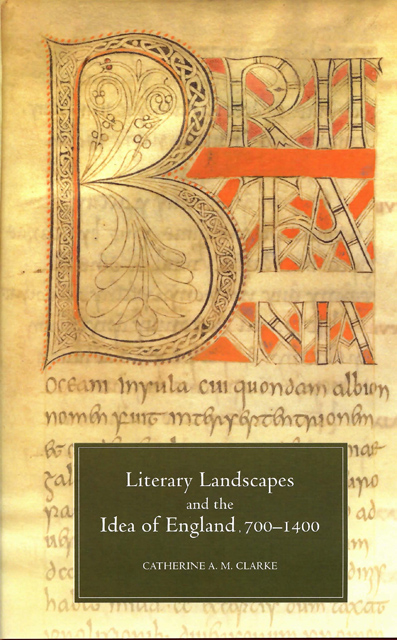Book contents
- Frontmatter
- Dedication
- Contents
- Acknowledgements
- Abbreviations
- Introduction
- Chapter One The Edenic Island
- Chapter Two Re-making the locus amoenus in Anglo-Saxon England
- Chapter Three Local Landscapes as Mirrors for England
- Chapter Four The Delightful City
- Epilogue: Disruptions and Continuities
- Bibliography
- Index
Introduction
Published online by Cambridge University Press: 28 February 2024
- Frontmatter
- Dedication
- Contents
- Acknowledgements
- Abbreviations
- Introduction
- Chapter One The Edenic Island
- Chapter Two Re-making the locus amoenus in Anglo-Saxon England
- Chapter Three Local Landscapes as Mirrors for England
- Chapter Four The Delightful City
- Epilogue: Disruptions and Continuities
- Bibliography
- Index
Summary
This other Eden, demi-paradise,
This fortress built by nature for herself
Against infection and the hand of war,
This happy breed of men, this little world,
This precious stone set in the silver sea,
Which serves it in the office of a wall,
Or as a moat defensive to a house
Against the envy of less happier lands;
This blessèd plot, this earth, this realm, this England…
These lines, from John of Gaunt's speech in Richard II, represent one of the most enduring and emotive visions of England in literature. Already in 1600, they were included in Robert Allott's anthology Englands Parnassus, and they continue to resonate in modern English political rhetoric, historiography and popular culture. The image of the paradisal, pastoral island re-surfaces in texts from Marvell's ‘Upon Appleton House’ to Blake's ‘Jerusalem’ and Winston Churchill's History of the English-Speaking Peoples. As in Richard II itself, the image is often used in dialectic with perceived contemporary betrayal or corruption of England's Edenic nature. Yet the powerful ideal of England as perfect pastoral outlives specific political contexts or satirical functions. The concept of ‘this other Eden’ binds together Christian resonance and privilege, ideals of cultivation and pleasure, and colonialist fantasies of a national identity and unity created and endorsed by the island's bounds. Studies of this rhetoric of English nationhood tend to begin with the Renaissance, often selecting Shakespeare as a point of origin. Gillian Beer writes that ‘Shakespeare’s Richard II provided the initiating communal self-description, alluringly emblematic and topographical at once’. Yet exploitation of the pastoral island landscape of Britain is already an established and powerful tradition in the medieval discourse of nationhood and production of national identity. Early Modern ideas and representations of England grow out of this medieval tradition.
This study explores literary landscapes and the idea of England in medieval English texts across Latin and the vernacular from 700 to 1400. It will focus on those symbolic landscapes which become most associated with ideological formulations of English space and identity – in particular the delightful pastoral landscape and the locus amoenus or ‘delightful place’. Ernst Robert Curtius, discussing classical and medieval Latin literary traditions, defines the locus amoenus as:
a beautiful, shaded natural site. Its minimum ingredients comprise a tree (or several trees), a meadow, and a spring or brook. Birdsong and flowers may be added. The most elaborate examples also add a breeze.
- Type
- Chapter
- Information
- Publisher: Boydell & BrewerPrint publication year: 2006

